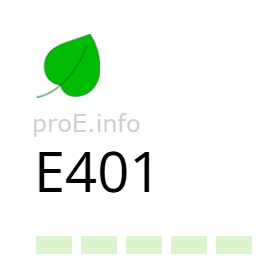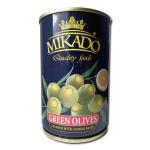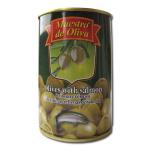
Other names for the additive (synonyms)
General Information
Sodium alginate (food additive E401) is a salt of alginate acid, which is mainly used in the food industry as a stabilizer, emulsifier, and thickener.
In nature, sodium alginate is found in brown algae (laminaria, fucus). Industrially, it is obtained from red and brown algae harvested in the Philippines, Indonesia, and also in coastal zones of Japan, France, the USA, and China. In addition, there are small-scale productions in Russia, India, and Chile.
From a chemical point of view, sodium alginate is a natural polysaccharide consisting of residues of D-mannuronic and L-guluronic acids. The chemical formula of the compound is (C6H7O6Na)n.
In terms of its physical properties, additive E401 is a cream or light brown powder that dissolves well in water, retains moisture, has a stabilizing effect, and is generally a gelling substance. The use of sodium alginate in the food industry is based on its ability to form gels.
Effects on the Body
Benefits of Additive E401
Historically, the healing properties of alginic acid and its salts have been known for a long time. As early as the 1970s, there were searches for compounds capable of binding and removing heavy metal salts and radionuclides from the body. At that time, brown algae became the main object of research. The results showed high efficiency of alginates in combating the consequences of radiation. Many healing properties of seaweed are explained precisely by the presence of alginic acid salts.
The salts of alginic acid are good enterosorbents: they bind and remove radionuclides and heavy metals from the body, as well as promote wound healing.
Other studies have shown that alginates can lower cholesterol levels and normalize lipid metabolism by suppressing the rise in triglycerides in the blood and reducing total fat mass.
Thanks to their ability to retain water and form gels, alginates are used as auxiliary substances in medicine and pharmacology. Experiments have shown that they have radioprotective properties and reduce the load on the body when exposed to toxins.
Risks of Additive E401
Overall, sodium alginate is considered a low-toxicity compound. Numerous animal studies have established that even at very high doses (grams per kg of body weight), side effects are limited to minor changes in liver parameters, which remain within the normal range.
In humans, in rare cases, excessive consumption of alginates can cause a laxative effect or interfere with the absorption of some trace elements (for example, calcium and iron).
According to JECFA (Joint FAO/WHO Expert Committee on Food Additives), alginates are recognized as safe, with an acceptable daily intake (ADI) set at up to 50 mg/kg of body weight.
EFSA (European Food Safety Authority), in its re-evaluation of alginic acid and its salts (E400–E404) in 2017, concluded that there was no need to establish a numerical ADI, since at declared levels of use, alginates do not pose a health risk.
Uses
Sodium alginate is widely used in the food industry. Its main role is as a stabilizer, thickener, and gelling agent. Additive E401 is used in the production of marmalade, candies, jellies, jams, mayonnaise, and sauces, meat and fish jellies, as well as food concentrates. Another area of application is the clarification of fruit juices and imparting cloudiness to soft drinks.
Due to its properties, sodium alginate makes it possible to give structure and viscosity to liquid solutions. This is why demand for it in industry is increasing every year.
In addition to the food industry, sodium alginate is used:
- in pharmacology and cosmetics — as an emulsifier stabilizer in creams and lotions;
- as a base for ointments and lipsticks;
- in medicine — as an enterosorbent that removes heavy metals and radionuclides.
Legal Status
Food additive E401 is permitted for use in most countries of the world. In the European Union, its use is regulated by Regulation (EC) No 1333/2008, where it is included in the list of authorized additives. In 2017, EFSA confirmed its safety at declared levels of use.
In the USA, the Food and Drug Administration (FDA) classifies sodium alginate as GRAS (Generally Recognized As Safe).
JECFA (FAO/WHO) established an acceptable daily intake (ADI) of up to 50 mg/kg of body weight. In Ukraine and CIS countries, additive E401 is also officially permitted for use in food products. In Canada and Japan, sodium alginate is recognized as safe and used without restrictions, except for established technological norms.

